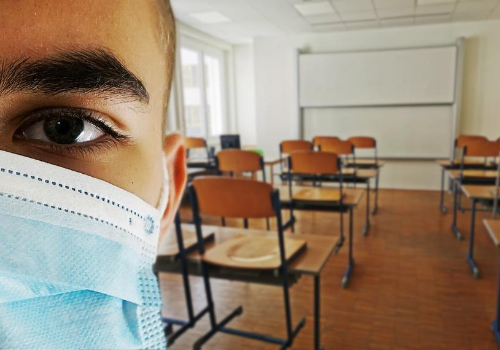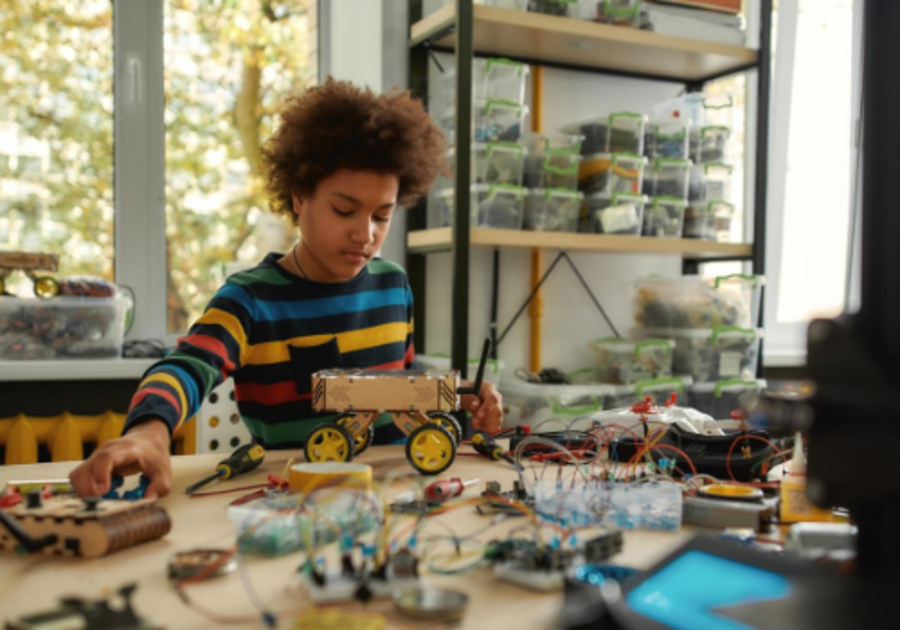Going back to school has never been like this before. Many of us are making choices between virtual learning, homeschooling, or returning to a traditional classroom — and figuring out what's right for our families is anything but easy.
We compiled tips from experts and experienced parents on how parents can succeed this school year no matter what choice they make for their family:

Going back to a school building

Is your child going back to school at least part-time? We talked to Michael Rich, MD, MPH. He is an associate professor of pediatrics at Harvard Medical School and Social and Behavioral Sciences at the Harvard T.H. Chan School of Public Health, and also the founding director of the Clinic for Interactive Media and Internet Disorders. He also has two teenage sons.
Dr. Rich talked with us about how to prepare kids for this very uncertain school year if they'll be spending at least part of their time in a classroom setting. Here are his five tips:
1. Prepare them to wear masks and wash hands
The best way to do that? Be a good role model.
"Kids hear about 1 percent of what we say and 100 percent of what we do and that’s a critical thing to understand; they’re looking to us as models," Dr. Rich says.
So wear a mask without complaint when you're in public. Explain to your kids we wear masks to protect others, not just ourselves. That empathy and attitude will make an impression on your kids.
2. Make sure they're sleeping enough
If kids are on a hybrid schedule — partly learning in school and partly learning at home — it might be tempting to let them stay up late on nights they don't have to go to school the next day. But it's important that kids get enough sleep and are in a routine of going to bed and waking up at the same time each day.
"They will complain about it, but we have a biological clock that needs to be respected. Most kids do their best thinking in the morning so need to be well rested then," Dr. Rich says.
3. Keep them on a schedule
Kids depend on routine at school. If your kids are doing hybrid schooling, keep them on a schedule when they're at home, with regular work times, break times, and play times.
"When you don’t have a schedule, they feel unmoored," Dr. Rich says. "That builds anxiety. They might not be aware of it or understand that, but the reality is that structure — at school and at home — gives them a solid foundation."
4. Communicate with teachers
"We have to understand how exhausting this is for teachers," whether they're in a classroom or teaching remotely, Dr. Rich says. Communicating often and openly with teachers will help your child succeed. Let your teachers know often how much you appreciate the hard work they're putting in this year, but also don't hesitate to let them know if your child is struggling.
5. Think differently about screen time
Social distancing rules might make it hard for kids to socialize in school, an unfortunate byproduct of the reality of a pandemic, Dr. Rich says.
"It’s important to remember social emotional learning is as important and maybe even more important than academic learning in school," he says. "The good thing is we are seeing some uses of the online space in positive way particularly in terms of social-emotional learning."
Before the pandemic he talked to many parents who were nervous about how much time their kids spent on online games. But now?
"When you listen to kids talk about things like Fortnite or Minecraft, they're talking about it more as time hanging out with friends," Dr. Rich says. "It's become the equivalent of the sandlot where they meet to play baseball." The best online multiplayer games are creative and can teach kids things like teamwork and playing well with others.
Of course, you need to pay attention to who your children are interacting with online, and also make sure they are getting plenty of outdoor time too, Dr. Rich says.
Virtual learning

Some of us are choosing virtual schooling. Other parents have been thrust into the role by districts or states. No matter whether the choice was yours or not, you want your child to succeed on an e-learning platform. Here are five virtual back-to-school tips from Gillian Pridgen, the publisher of Macaroni Kid Boca Raton and Macaroni Kid Coral Springs, Fla.:
1. Practice your technology
Not so tech savvy? Don't be afraid to ask for help. After all, we are learning together. Reach out to a tech-savvy friend, family member, or to your child's school for help.
2. Check school-related communications often
It's likely teachers and administrators will be sending frequent communications to you — ranging from assignments to changes in schedules — as schooling ramps up. Aim to be the parent who is on top of communication. Make it a habit to check for messages once or twice a day from your school.
3. Set-up a virtual learning schedule
As Dr. Rich notes above, kids need routine. Have kids practice good learning habits by being prepared for school each morning by getting dressed and eating a good breakfast. That will help them be alert and ready to take on the daily tasks ahead of them. Be sure to schedule in breaks too!
4. Create a climate of learning
Find an area in your home where noise can be kept to a minimum and where the lighting is good for a positive learning experience. If you have younger students, consider decorating your at-home-classroom to make it more inviting and fun. Click here to see more tips on creating an environment conducive for at-home learning.
5. Get your supplies ready before the first day of school
Virtual learning is best when students have all they need to complete and turn in assignments. Kids will likely need a computer, laptop, or tablet, along with a webcam, printer, printer paper, printing cartridges, and an Internet connection (some school districts are offering these types of supplies free to students). You'll also want basic school supplies like notebooks, pencils, pens, scissors, and folders.
Feeling lost? Reach out to your child’s school administration with questions. Most are working in the office now to prepare and likely have answers for you. Try seeking out a fellow parent who can fill in the blanks. PTO or room parents are usually good contacts.
Homeschooling
Brandy Watson has been homeschooling her kids for several years, and is the publisher of Macaroni Kid Tupelo, Miss. She offered these top five tips about how to thrive at homeschooling:
1. Don’t try to keep public school hours
Listen to me, mamas, one of the most important lessons that I have learned over the years is that you can learn an entire day’s worth of school work in just a couple of hours at home. With the advantage of one-on-one instruction and fewer distractions, you’ll find their attention levels are higher and you can get more done in less time.
2. Learning comes in many forms
Don’t underestimate how much kids learn just by living life with you. Doing written work is great, but research shows kids learn a ton just by playing and it is an essential part of child development! You can turn virtually anything into a learning experience. Do you love cooking? Practice math skills by letting your kids help in the kitchen. Love to be outside? Nature is an amazing place to learn real-world science lessons. Look under rocks and see what flora and fauna you find just on a walk in your neighborhood. Get a book that helps you identify local plants and trees. The possibilities are endless!
3. Take breaks
You are going to butt heads with your kids. There may be tears. There may be yelling. It’s hard. I won’t sugarcoat it for you and tell you that you’ll get through this completely unscathed. Tensions are high during uncertainty and having routines interrupted only adds to the chaos. Knowing (and accepting) this ahead of time will help you to stay calm and collected when things aren’t going as smoothly as you’d hoped. Take breaks! If I can promise you anything, it is this: Your child’s education will not suffer if you need to step away and regroup for a bit, or even take a day off.
4. Busy work is worthless
If the work is not meaningful, it’s useless. Know your child’s learning style and use it to your advantage. You don’t have to do things exactly like public schools for your child to learn.
5. Find support
Being confined to the house can make parents feel very lonely and isolated. Even if you can’t get out of the house, it is essential that you form a support system! Schedule FaceTime and wine dates with your best friend after the kids go to bed. Use Zoom to organize a virtual storytime with a few of your kids’ friends. Please know that you’re not alone in this! With the technology that is available, there are tons of ways to stay connected to the world without risking your family’s health.
Read more tips from Brandy and find a list of her favorite no-cost homeschooling resources here.

🌸🌸🌸



